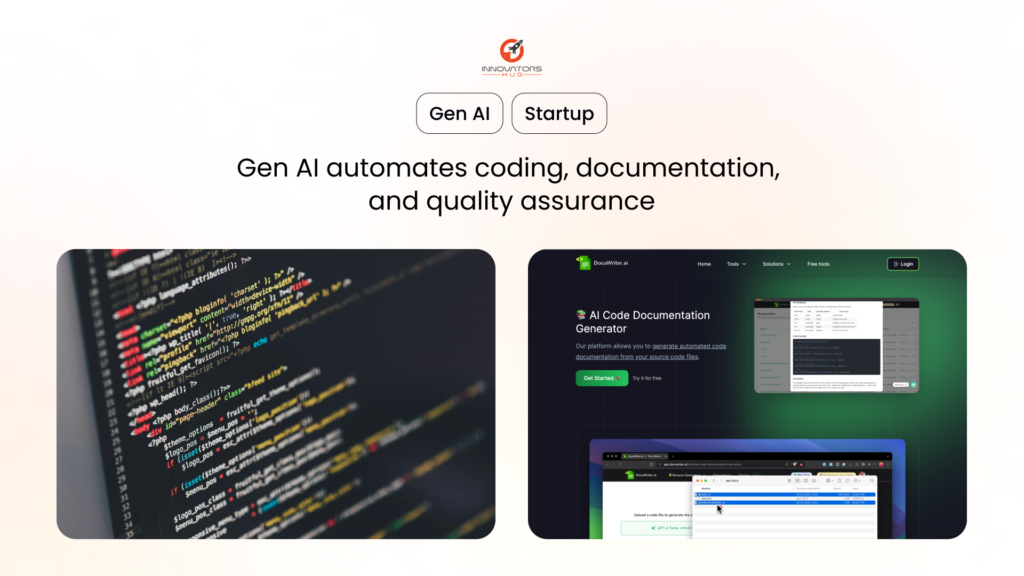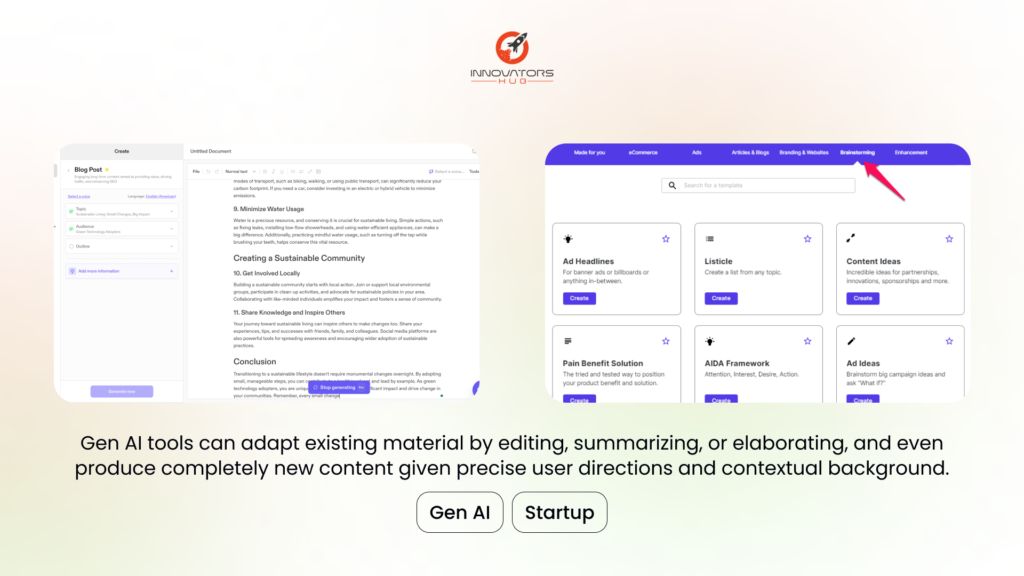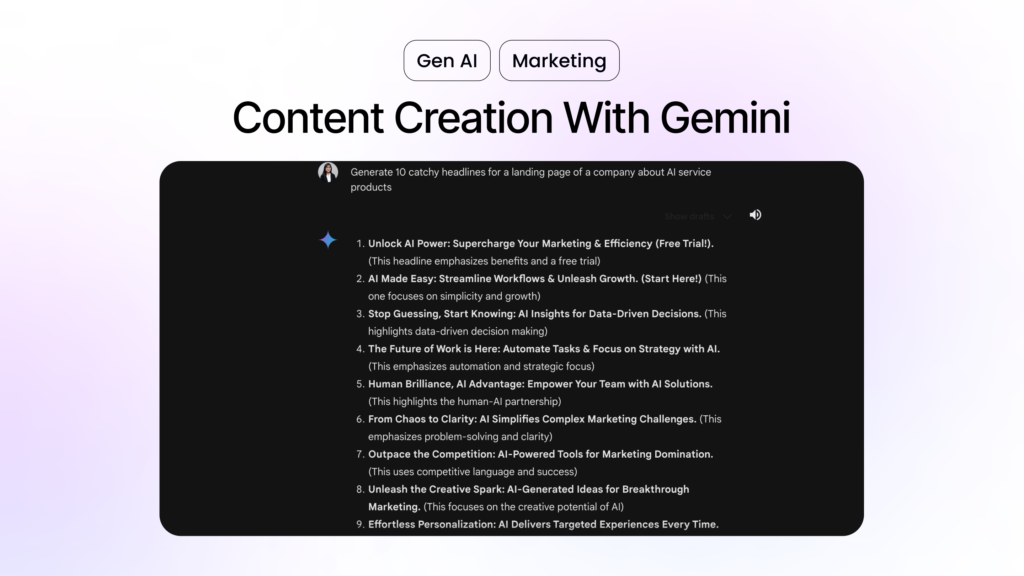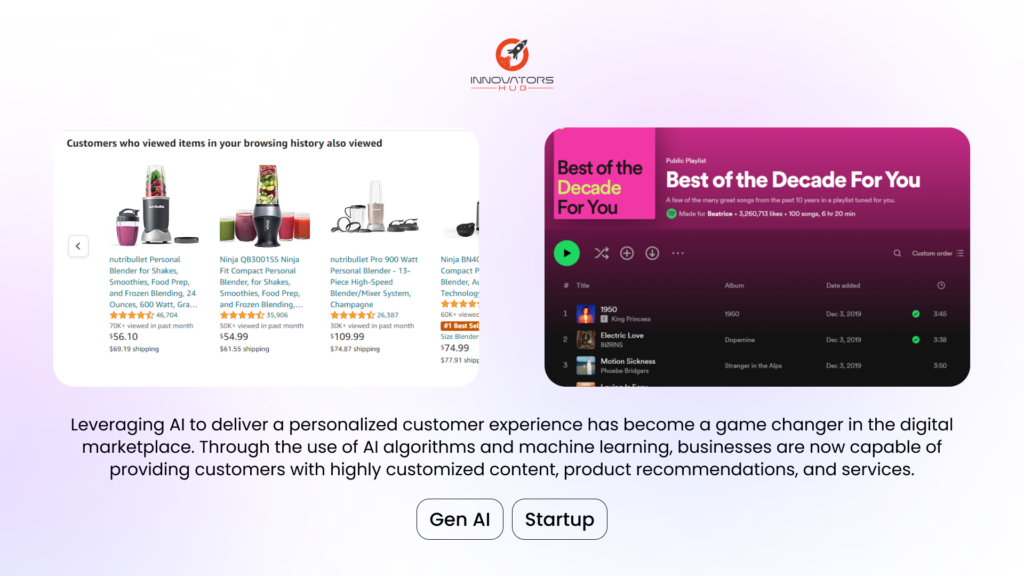Generative AI (Gen AI) is the algorithms (such as ChatGPT) that can be used to create new content, including text, images, audio, code, simulations, and videos. The latest annual McKinsey Global Survey confirms the explosive growth of Gen AI in Startups and Businesses starting from 2024.
Approximately a year after these Gen AI tools were released, one-third of the McKinsey Global Survey respondents report that their organizations are using Gen AI in at least one business function. Right now, nearly one-quarter of surveyed C-suite executives say that they are personally using Gen AI tools for work, and more than one-quarter of respondents from companies using AI say Gen AI is already on their board’s agendas. These findings show that adopting technological advancements is considered to be essential for business and startup development.
The next question for those in business is what are the best business uses? Here are 15 highly productive ways that Gen AI use cases can help businesses improve and revolutionize their operations.
Gen AI In Startups Automates Coding, Documentation, and Quality Assurance
Generative AI can automatically generate code, documentation, and test cases, accelerating the software development lifecycle. AI assistants can understand natural language requirements and convert them into clean, functional code. This streamlines development, reduces errors and frees up developers to focus on higher-level tasks.
For those in software development and programming, generative AI has the ability to author, finish, and review software code. Quality assurance stands out as a key application of this technology, with generative AI models taking on roles such as debugging, creating tests, and producing various forms of documentation.

As these AI coding tools evolve, they are increasingly enabling non-developers to generate code through queries in natural language. This capability represents a significant step towards making technology more accessible and democratically available in the business world.
However, a lesser-known benefit is that these tools can also enhance the work of seasoned developers and programmers. For those seeking to navigate through coding projects more swiftly or with reduced mistakes, generative AI tools offer valuable recommendations. Features like code autocompletion, identifying and fixing errors, and code refactoring to simplify and optimize complex code are some of the advanced supports these tools provide.
Content Generation and Brainstorming with Gen AI in Startups

With accurate prompts and guidance, Large Language Models (LLMs) possess the capability to craft fitting and inventive content across various platforms including blogs, social media, product descriptions, and corporate websites.
These generative AI tools can adapt existing material by editing, summarizing, or elaborating, and even produce completely new content given precise user directions and contextual background. Such models are adept at tailoring content creation according to the desired tone, style, and incorporating previous brand-related writings, ensuring the output remains authentic and resonates with the target audience.

Yet, it’s critical for users to bear in mind that AI-generated texts may sometimes present factual errors or unfounded statements, especially in journalistic or evidence-based contexts. Therefore, it falls upon writers, editors, and quality assurance personnel to meticulously verify the accuracy of AI-created content before its dissemination.
Gen AI in Startups Generates Marketing Performance Analysis & Reports
In the domain of marketing, generative AI tools dramatically streamline the process of performance analysis and reporting. These sophisticated systems can sift through vast amounts of data, identifying patterns, trends, and insights that might elude human analysts.
By automating the generation of reports, marketers can save significant time, allowing them to focus more on strategy and less on the tedious aspects of data compilation and interpretation. AI not only offers deep analysis with accelerated speed but also provides predictive analytics, giving marketers a foresight into potential future trends and consumer behaviors. This level of analytics empowers businesses to make data-driven decisions swiftly, optimize their marketing strategies in real time, and enhance overall campaign performance.
However, the human touch remains invaluable in interpreting data insights and making creative decisions based on AI recommendations, ensuring that strategies align with brand values and objectives.
Deliver Quick and Superior Customer Services through Gen AI in Startups
In today’s competitive landscape, delivering quick and superior customer service is paramount to ensuring customer satisfaction and loyalty. Artificial Intelligence (AI) stands as a pivotal tool in revolutionizing customer service operations, enabling businesses to provide personalized, efficient, and round-the-clock support. AI-powered chatbots and virtual assistants can handle a multitude of customer queries simultaneously, reducing wait times and freeing human agents to tackle more complex issues.
Furthermore, AI can analyze customer data to offer tailored recommendations, solve problems proactively, and even predict future inquiries, thus enhancing the overall customer experience. Despite the automation, the importance of human empathy and understanding cannot be understated, as these elements foster deeper customer relationships and trust.
Personalized Customer Experience
Leveraging artificial intelligence (AI) to deliver a personalized customer experience has become a game changer in the digital marketplace. Through the use of AI algorithms and machine learning, businesses are now capable of providing customers with highly customized content, product recommendations, and services. This level of personalization makes customers feel understood and valued, significantly enhancing their engagement and loyalty towards a brand.

AI’s ability to analyze vast amounts of data in real time allows for the adaptation of marketing strategies to individual customer preferences and behaviors, offering a unique shopping experience for each user. While AI handles data analysis and segmentation, the creative presentation of personalized content still relies heavily on human intuition and creativity to resonate with the target audience effectively.
Promote up- and cross-selling
AI technologies significantly enhance the efficacy of up-selling and cross-selling strategies. By utilizing predictive analytics and customer data analysis, AI can accurately forecast which products or services a customer is most likely to purchase next. This ability allows businesses to present relevant offers and recommendations at the optimal time, increasing the chances of conversion.
For example, an e-commerce platform could use AI to suggest accessories or warranties at the checkout page, based on the items in the shopping cart and the customer’s previous purchasing behaviors.
Meanwhile, cross-selling is facilitated by AI’s understanding of customer profiles and buying patterns, enabling the suggestion of complementary products, thereby not only boosting sales but also improving the customer shopping experience. AI’s precision in targeting and timing ensures that these strategies are implemented in a way that feels personalized and attentive, rather than intrusive, fostering positive customer relationships and loyalty.
Sentiment Analysis and Feedback Management
AI’s role extends into decoding the nuances of customer feedback and social media engagement through sentiment analysis. This technology interprets the emotional tone behind text data, enabling companies to understand customer sentiments, whether positive, negative, or neutral.
Businesses can leverage this insight to refine their products, services, and customer interactions, ensuring they align more closely with customer needs and expectations. Sentiment analysis facilitates a proactive approach to feedback management, allowing brands to address issues or negative experiences swiftly, often before they escalate. By monitoring and analyzing customer opinions across various platforms in real time, companies can gain a comprehensive view of their public perception, enabling them to make informed decisions that enhance their reputation and customer satisfaction.
This level of responsiveness and attentiveness to customer feedback not only improves product and service quality but also strengthens customer trust and loyalty, laying a solid foundation for long-term business success.
Risk Management and Fraud Detection
In the realm of risk management and fraud detection, AI exhibits remarkable capabilities. By analyzing vast quantities of transaction data in real time, AI systems can identify patterns and anomalies that may indicate fraudulent behavior. This proactive approach allows businesses to mitigate risks before they manifest into larger issues.
Furthermore, machine learning models continually evolve, learning from new data and improving their predictive accuracy over time. This means that as new fraudulent schemes emerge, AI systems adapt, providing businesses with a dynamic defense mechanism against fraud. The implementation of AI in risk management not only protects the company’s assets but also secures customer trust by demonstrating a commitment to safeguarding their information and financial well-being.
Enhance cybersecurity
In the sphere of enhancing cybersecurity, AI’s contribution is both transformative and vital. Through the deployment of sophisticated algorithms, AI-powered tools can constantly monitor networks for suspicious activities, identifying potential threats before they can cause harm. This preemptive detection is critical in an era where cyber threats evolve rapidly.
AI systems can analyze behaviors over networks to spot deviations that might signal a cyberattack, enabling security teams to respond immediately. Furthermore, AI can assist in developing stronger authentication methods and encrypting data to make it more secure. By integrating AI into their cybersecurity strategies, organizations can significantly fortify their defenses against increasingly sophisticated cyber threats, ensuring the security and integrity of their data and that of their customers.
Boost application performance
AI’s role in boosting application performance cannot be underestimated. It enables applications to become more efficient, intelligent, and personalized. Machine learning algorithms analyze user behavior and preferences to optimize the application’s functionality, ensuring a smoother, more responsive experience for the user.
This personalization extends to predictive text in messaging apps, tailored content recommendations on streaming platforms, and dynamic resource allocation in software applications, improving both performance and user satisfaction.
Additionally, AI-driven analytics help developers identify and rectify performance bottlenecks, ensuring the application remains fast and reliable. Thus, the integration of AI into application development not only enhances the user experience but also contributes significantly to the operational efficiency of the application.
Introduce Personal Assistant
AI has revolutionized how we interact with technology, giving rise to sophisticated personal assistants that understand and predict our needs with remarkable accuracy. These digital assistants, powered by advanced natural language processing and machine learning algorithms, can schedule appointments, send reminders, make recommendations, and even control smart home devices, all through voice commands or text inputs.
They are constantly learning from interactions to provide more personalized experiences, making everyday tasks easier and more efficient. This seamless integration of AI into daily life not only enhances productivity but also offers unprecedented convenience, highlighting the profound impact of artificial intelligence on modern living.
The Bottom Line
The versatility and potential of Gen AI in streamlining operations, enhancing creativity, and driving strategic initiatives are evident across these 15 use cases. By integrating Gen AI into their core functions, startups and businesses not only unlock new avenues for growth but also redefine the boundaries of what’s possible.
As you contemplate the future of your startup or business, consider how Gen AI can revolutionize your approach to challenges and objectives. Though it’s essential to remain mindful of Gen AI’s limitations, such as data bias and ethical considerations, with responsible implementation, Gen AI stands as a robust tool for innovation and efficiency.
In navigating the complexities of today’s digital landscape, Gen AI emerges as not just a technological asset but a foundational pillar for the businesses of tomorrow. Now is the time to explore how Gen AI can transform your operations and propel your business toward unprecedented success.







